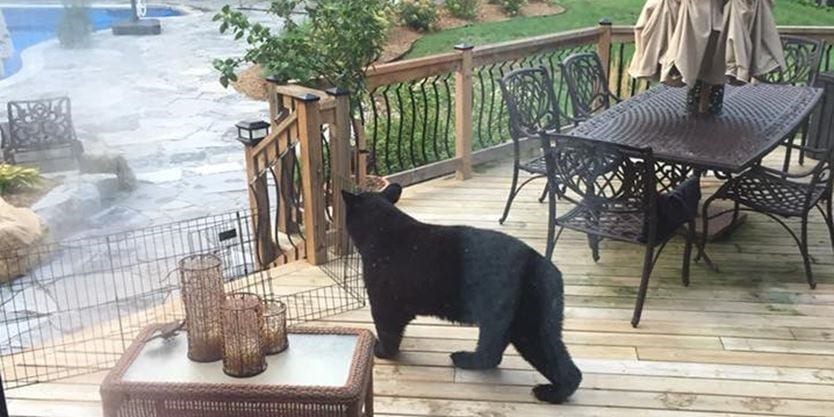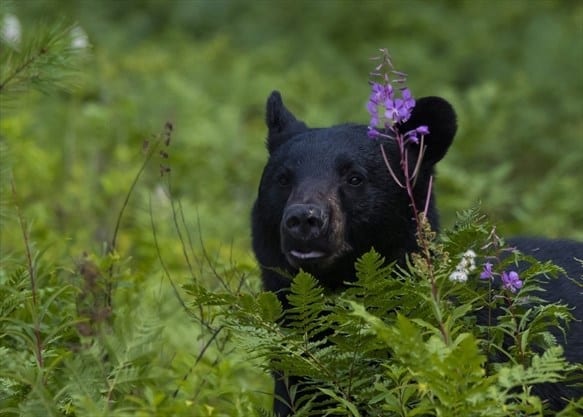HOW TO PREVENT CONFLICTS WITH BLACK BEARS
• Bears are attracted into urban and rural areas to get food. They will topple bird feeders, ransack barbecues, raid garbage cans and even try to enter buildings.
• If they learn that they can find food where people live, bears will return again and again.
• When bears pick up a scent with their keen noses, they will investigate it. If they find bird food, garbage or pet food they will return as long as the food source is available.
• Put garbage out only on the morning of garbage day, not the night before.
• Put garbage in containers that have tight-fitting lids and store it in a bear-proof location, such as your basement or a sturdy garage.
• Spray garbage cans and lids with bleach or another a strong disinfectant.
• Fill bird feeders only through the winter months.
• Put away feeders in the spring and instead, offer birds natural alternatives (e.g. flowers, nesting boxes, fresh water).
• Do not leave pet food outdoors, in screened-in areas or porches.
• Pick all ripe and fallen fruit from trees and shrubs on your property.
• Plant non-fruit bearing trees and shrubs.
• Burn off food residue and wash barbecue grills right away.
• Empty the grease trap every time you barbecue.

HOW TO AVOID BEAR-HUMAN INTERACTIONS
Whenever outside in bear country:
• Travel in groups of two or more (bears primarily attack people who are alone).
• Make noise as you move through areas where visibility is restricted or where background noise is high, such as near streams and waterfalls (e.g., singing, whistling or talking will alert bears to your presence, giving them a chance to avoid you).
• While outdoors, keep your eyes and ears open: scan your surroundings to check for bears; do not wear headphones and watch for signs of bear activity (e.g., tracks, claw marks on trees, flipped-over rocks or fresh bear droppings).
• If you are out with a dog, leash it (uncontrolled, untrained dogs may actually lead a bear to you).
• Pay attention, especially if you are working, gardening or berry picking.
• Rise slowly if you are in a crouched position so that you don’t startle nearby bears.
• Carry a whistle or air horn.
• Learn how to use bear pepper spray and carry it somewhere that’s easy to access.
• Consider carrying a long-handled axe if you are in remote areas or deep in the forest.
IF YOU ENCOUNTER A BLACK BEAR
• Stop. Do not panic. Remain calm. When bears are caught off guard, they are stressed and usually just want to flee. Generally, the noisier the bear is, the less dangerous it is, provided you don’t approach the bear. The noise is meant to “scare” you off and acts as a warning signal.
• Do not try to get closer to the bear for a better look or picture.
• Make sure the bear has a clear escape route — don’t corner a bear.
• Always watch the bear and slowly back away until the bear is out of sight.
• Get inside, if you are near a building or vehicle.
• Leave the area, if you are berry-picking, hiking, camping, jogging or cycling.
• If you are with others, stay together and act as a group.
• If the bear does not get closer to you, slowly back away, talking to the bear in a quiet, monotone voice.

HOW TO DETERMINE IF A BEAR MIGHT ATTACK
Black bear attacks are extremely rare. A black bear may attack if it feels threatened, if it perceives you to be a threat to it or its cubs, or it may be defending food. A predatory bear — usually in rural or remote areas — will approach silently and may continue to approach regardless of your attempts to deter them by yelling or throwing rocks.
Here are the warning signals threatened or predatory bears will give you. If you’re too close, a bear may:
• Stand on its hind legs — a bear usually stands to get a better look at you or “catch your scent.” This is not aggressive behaviour.
• Act defensively — If a bear feels threatened by your presence, it may try to get you to back off and leave it alone. To do this, it may: salivate excessively; exhale loudly; make huffing, moaning, clacking and popping sounds with its mouth, teeth and jaws; lower its head with its ears drawn back while facing you; charge forward; and/or swat the ground with its paws (known as a “bluff” charge).
• DO NOT: scream, turn your head, run, kneel down, make direct eye contact, climb a tree or retreat into water or try and swim.
• DO: Wave your arms to make yourself look bigger and yell at the bear to go away, throw objects, blow a whistle or air horn.
• IF THE BEAR KEEPS ADVANCING: Stand your ground, use your bear pepper spray (if bear is close) or anything you can use to threaten or distract the bear.
• IF THE BEAR ATTACKS: Use your pepper spray, fight back with everything you have, do not play dead except in the rare instance you are sure a mother bear is attacking you in defence of cubs and your initial attempts to deter the bear have been unsuccessful.
